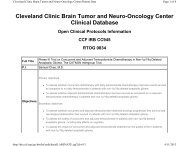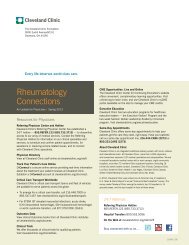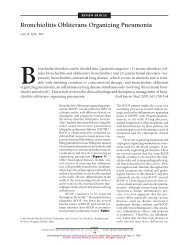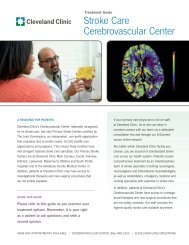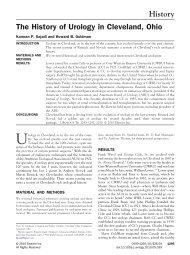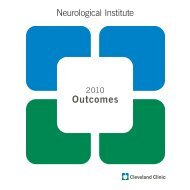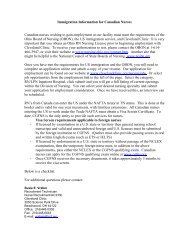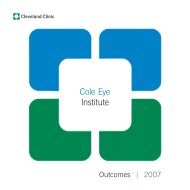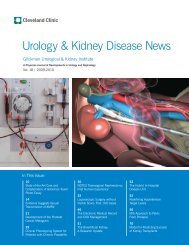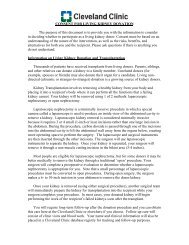Brain Tumor and Neuro-Oncology Center - Cleveland Clinic
Brain Tumor and Neuro-Oncology Center - Cleveland Clinic
Brain Tumor and Neuro-Oncology Center - Cleveland Clinic
Create successful ePaper yourself
Turn your PDF publications into a flip-book with our unique Google optimized e-Paper software.
2008 ANNUAL REPORT<br />
involving approximately 10 centers, to study the process<br />
of CNS metastasis in breast cancer patients. Overall,<br />
it is a $17 million award (direct <strong>and</strong> indirect costs),<br />
with nearly $2.7 million coming to Clevel<strong>and</strong> <strong>Clinic</strong> to<br />
fund a clinical trial, the majority to fund proteomics<br />
research on the identification of proteins that go with<br />
the process of brain metastasis. Patricia Steeg, the<br />
head of the Women’s Cancers Section at the National<br />
Cancer Institute, is the lead Principal Investigator<br />
for the COE. Work on proteomic profiling, comparing<br />
breast cancers from women who have never developed<br />
a brain metastasis with those who have, is ongoing.<br />
The goal is to identify a set of genes <strong>and</strong> proteins in<br />
the original breast cancer that may suggest which<br />
women may be at risk of developing breast cancer<br />
that will metastasize to the brain, both to develop<br />
surveillance methods to find such tumors early <strong>and</strong>,<br />
more importantly, to devise strategies <strong>and</strong> treatments<br />
that may prevent them from developing.<br />
Pituitary <strong>Tumor</strong>s This is an area of clinical interest in<br />
which several important publications have resulted<br />
from work done together with Lauri Aaltonen in Finl<strong>and</strong>,<br />
showing that mutations in the aryl hydrocarbon<br />
receptor interacting protein gene (AIP) may play a role<br />
in the formation of pituitary tumors, especially familial<br />
acromegaly (excess growth hormone secretion due to<br />
a pituitary tumor) or early onset of these tumors in the<br />
sporadic setting. This has resulted in two publications<br />
in prestigious journals, including Proceedings of the<br />
National Academy of Sciences USA (PNAS), 104(10):<br />
4101-5, 2007 <strong>and</strong> <strong>Clinic</strong>al Endocrinology, in press.<br />
Collaborative Laboratories<br />
Jeremy Rich, MD, PhD *<br />
Dr. Rich joined Clevel<strong>and</strong> <strong>Clinic</strong> as Chair of the<br />
Genomics Institute in September 2008. He is a worldrenowned<br />
expert on brain tumor stem cells as well as<br />
being a clinical neuro-oncologist. Dr. Rich will carry<br />
on his cutting-edge brain tumor stem cell research in<br />
collaboration with BTNC clinicians <strong>and</strong> scientists.<br />
*Denotes Clevel<strong>and</strong> <strong>Clinic</strong> physician or scientist.<br />
Jaharul Haque, PhD *<br />
Dr. Haque’s laboratory investigates the role of the<br />
transcription factor STAT3 to drive the malignant<br />
behavior of gliomas. In collaboration with Dr. Michael<br />
Vogelbaum, this project obtained NIH funding:<br />
“Cytokine Signaling in Glioblastoma Cells.” NIH R01 CA<br />
95006-01 (MAV co-PI; 10% effort; PI: Jaharul Haque<br />
PhD; 6/1/03 – 5/31/08, total direct costs: $1.6 million)<br />
<strong>and</strong> generated multiple peer-reviewed publications. A<br />
follow-up funding proposal has been submitted to NIH<br />
for review.<br />
Susan Brady-Kalnay, PhD<br />
Dr. Brady-Kalnay’s laboratory has investigated the role<br />
of a novel phosphatase in regulating the invasion <strong>and</strong><br />
migration of malignant glioma cells. In collaboration<br />
with Dr. Michael Vogelbaum, this project obtained<br />
NIH funding: “PTPµ Suppresses <strong>Brain</strong> <strong>Tumor</strong> Cell<br />
Migration <strong>and</strong> Dispersal.” NIH R01 NS051520-01A1<br />
(MAV collaborator, 5% effort; PI: Susan Brady-Kalnay<br />
PhD; 6/1/2006 – 5/31/2011, total direct costs:<br />
$1.9 million). Over the course of this granting period,<br />
we have performed in vivo studies to evaluate how<br />
alterations in the functioning of PTPµ affect the ability of<br />
human glioma xenografts to invade in rodent brains.<br />
James Finke, PhD *<br />
Dr. Finke has been involved with investigation of<br />
the immunobiology of gliomas. Prior studies of<br />
malignant gliomas have shown that gliomas are<br />
immunosuppressive, as evidenced by decreased T cell<br />
function <strong>and</strong> the presence of apoptosis in a subset of<br />
lymphocytes from patients’ blood. GBMs are known to<br />
overexpress several different gangliosides that can be<br />
shed from the tumor <strong>and</strong> promote T cell dysfunction.<br />
More recently, it has also been clear that the tumor<br />
microenvironment can promote the accumulation<br />
of immune cells with suppressive activity that can<br />
prevent the development of anti-tumor immunity. This<br />
includes the T-regulatory population as well as myeloid<br />
derived suppressor cells (MDSC). Underst<strong>and</strong>ing<br />
25



